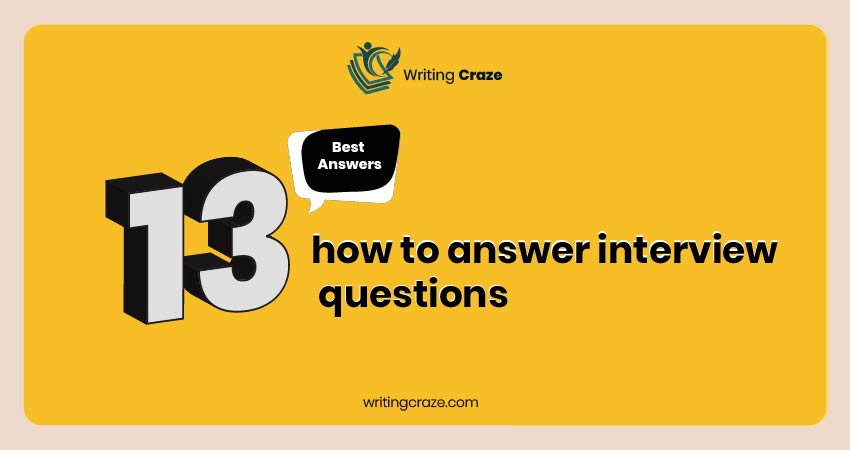How To Answer Interview Questions [13 Examples]
want to write a How To Answer Interview Questions When you’re interviewing for a new job, you can expect to field questions from potential employers about your qualifications, experience, and goals. While some questions may be easy to answer off the top of your head, others may require a bit more thought.
To help you prepare, we’ve compiled a list of 13 common interview questions and examples of how you can answer them. Whether you’re a recent graduate or an experienced professional, these tips will help you put your best foot forward during the interview process.
Answering these questions effectively will not only demonstrate your suitability for the role, but also give the interviewer insight into your thought process, problem-solving ability, and communication skills. So take some time to prepare before your next interview, and remember to stay confident and positive throughout the conversation!
5 Most asked Interview Questions
Interviewing for a new job can be daunting. You want to make sure you’re prepared for anything the interviewer might throw at you. To give you a leg up, we’ve compiled a list of the five most commonly asked interview questions.
- Tell me about yourself.
- Why are you interested in this position?
- What are your strengths?
- What are your weaknesses?
- Do you have any questions for me?

Interview Questions and How To Answer
Interview questions can be difficult to answer, especially if you are not prepared. The best way to answer interview questions is to be honest and open. Be ready to talk about your qualifications and experience. Try to avoid giving lengthy or complicated answers. Be concise and to the point. And try not to get too nervous! Remember, the interview is a chance for you to sell yourself and show the interviewer why you are the best candidate for the job. So take a deep breath, relax, and be yourself.
Answer Example 1:
My name is , and I am a . I have _ years of experience in the field. I am currently seeking a position as a _ in order to utilize my skills and experience.
Answer Example 2:
My name is , I am good at , because . For example, . And I have also been praised for my ability to do/ handle/ complete tasks effectively.
How To Answer Salary Expectations
One of the most common questions asked during a job interview is “What are your salary expectations?” While it may be tempting to give a direct answer, it is important to avoid doing so. Instead, take a moment to consider the question and formulate a response that will not jeopardize your chances of getting the job.
One approach is to simply state that you are open to negotiation. This shows that you are interested in the position and willing to discuss compensation, but that you are not locked into a specific number. Another option is to give a range, based on your research of similar positions in the area. This shows that you have a realistic expectation of what the job is worth, and it gives the employer some flexibility in their offer.
Answer Example 1:
I’m really excited about this opportunity, and I’m confident that I can provide great value to the team. My current salary is [x], but I’m open to discussing a range that would be appropriate for this position.
Answer Example 2:
I’m very interested in this position, and I believe my skills and experience would make me a valuable asset on the team. I am currently earning [x] per year, but would be willing to entertain conversations around a salary that is more aligned with the responsibilities of this role.
How To Answer What Is Your Weakness
One of the most difficult questions to answer during a job interview is “What is your greatest weakness?” You don’t want to give a potential employer any reason to not hire you, but you also don’t want to lie or come across as boastful. The key is to select a weakness that is not essential for the job you are applying for and to emphasize the steps you are taking to improve upon it.
For example, if you are applying for a customer service position, you might say that you sometimes have trouble keeping a calm demeanor when dealing with angry customers. However, you could point out that you’ve taken some anger management classes and have found them to be helpful. By framing your response in this way, you can turn a potential liability into an asset.
Answer Example 1:
I’m not perfect and I have my share of weaknesses. My biggest weakness is , but I try to make up for it by . The reason I am aware of this weakness is because _.
Answer Example 2:
Everyone has weaknesses. My Weakness is ______ For me, it might be that I’m a little too critical of myself at times or that I get overwhelmed easily. But knowing my weaknesses is actually a strength, because it helps me stay mindful and work on improving myself. What’s your weakness?
How Do You See Yourself In 5 Years
It’s always difficult to predict the future, but if you’re asked about your plans for the next five years during a job interview, you need to have a well-thought-out answer. Employers want to know that you’re committed to the company and that you have long-term goals. Here are some tips for how to respond to this common interview question.
First, take a step back and think about your career goals. What do you want to accomplish in the next five years? Do you want to be promoted to a managerial position? Do you want to switch departments or teams? Once you have a general idea of where you see yourself in five years, start mapping out a plan to get there. What steps do you need to take in order to reach your goal?
Next, think about how your current role fits into your long-term plans. What skills and experience are you gaining in your current position that will help you in the future?
Finally, make sure your answer is realistic and aligns with the company’s goals.
Answer Example 1:
I see myself continuing to work hard and accomplish great things. I will be doing what I love and making a difference in the world. So, I will be happy, healthy, and surrounded by the people I love.
Answer Example 2:
I don’t like to make predictions because 5 years is a long time and anything could happen, but if everything goes according to plan I will be in a great place. continuing to work hard, doing what you love and making a difference in the world are all noble goals.
How To Answer What Is Your Greatest Weakness
One of the most common interview questions is “What is your greatest weakness?” While this may seem like a difficult question to answer, there are a few strategies you can use to craft a compelling response. First, try to think of an honest answer that will also show that you are self-aware and working to improve. For example, if you tend to get overwhelmed easily, you could say that you are working on developing better time management skills. Alternatively, you could focus on a skill that you are trying to improve.
For example, if you are applying for a job that requires excellent written communication, you could say that you are working on honing your writing skills. No matter what answer you choose, be sure to emphasize that you are aware of your weaknesses and taking active steps to improve. By doing so, you will demonstrate that you are both self-aware and committed to personal growth – two qualities that any employer would value.
Answer Example 1:
My greatest weakness is _____-I care too much about what other people think of me. This can sometimes hold me back from taking risks or doing things that I really want to do.
Answer Example 2:
-I find it difficult to say no, even if I’m overloaded with work or tasks. This can often lead to me overextending myself and feeling overwhelmed. I Think This Is My Greatest Weakness
Answer Example 3:
I would say my greatest weakness is that I work too hard. Sometimes I have a difficult time delegating and so I take on too much work myself. This can be a bit of a problem because it means that I’m not always able to give my best to everything that I’m working on.
Conclusion
I hope you found this blog helpful. The next time you are asked an interview question. Remember these tips and be sure to practice your answers before the big day. Interviews can be nerve-wracking, but they don’t have to be. With a little preparation and confidence, you will ace that interview and get the job of your dreams!


![How to Answer Why Should We Hire You [Example 15]](https://writingcraze.com/wp-content/uploads/2022/09/How-to-Answer-Why-Should-We-Hire-You-768x407.jpg)
![How to Answer Why are you Interested in This Position [Answers]](https://writingcraze.com/wp-content/uploads/2022/09/How-to-Answer-Why-are-You-Interested-in-this-Position-768x407.jpg)
![How To Answer What Are Your Career Goals [17 Examples]](https://writingcraze.com/wp-content/uploads/2022/09/How-to-answer-what-are-your-career-goals-768x407.jpg)
![How To Answer What Areas Need Improvement Examples [11 Sample]](https://writingcraze.com/wp-content/uploads/2022/09/How-to-answer-what-areas-need-improvement-examples-768x407.jpg)
![How To Answer What Are You Looking For [11 Samples]](https://writingcraze.com/wp-content/uploads/2022/09/How-to-answer-what-are-you-looking-for-768x407.jpg)
![How To Answer Salary Expectations On Application [09 Samples]](https://writingcraze.com/wp-content/uploads/2022/09/How-to-answer-salary-expectations-on-application-768x407.jpg)
